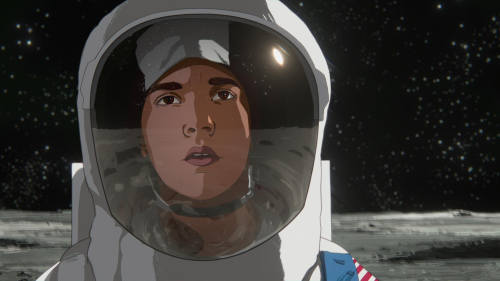
SXSW
MOVIE REVIEW
Apollo 10 1/2: A Space Age Childhood (2022)
Memory is a funny thing, isn’t it. Looking back, especially at your own family, often you remember only the best parts, and certainly you focus on what you want to see. In the summer of 1969, while the future Kenneth Branagh was in Belfast going to the cinema to admire Raquel Welch with his family, the future Richard Linklater was in a suburb of Houston also going to the cinema to admire Raquel Welch with his brothers, but more often to watch movies about space. Practically everyone in the Houston area was involved in the space race, including young Stan (voiced by Milo Coy). Believe it or not, his kickball skills brought him to NASA’s attention, since – due to a minor math mishap – one of the space modules had been built at half size. So while his family thought he had a summer camp scholarship, Stan endured months of training to become the first boy to walk on the moon.
As narrated by Jack Black, this flight of fancy, which premiered at SXSW Film Festival, is all of a piece in this nostalgic look at one boy’s lovely childhood. Stan is the youngest of six children, including a brother named Steve (voiced by Eyland Gaddy-Brewer) and a sister named Stephanie (voiced by Danielle Guilbot). Their mother (voiced by Lee Eddy) runs their rowdy home efficiently, getting the kids to do a packed-lunch assembly line every Sunday night without ever putting down her cigarettes. Their father (voiced by Bill Wise) works in shipping and receiving for NASA, an embarrassingly uncool job, but one which provides a comfortable life for eight people on one salary. The kids squabble over the television, eat Frito pie at the pool, play games in the street behind the pesticide truck, and generally have the idyllic, privileged American childhood that Hollywood wants to make movies about. The news reports and the pop culture of the time receives the same rotoscoped attention to detail that’s become a Linklater trademark. When it comes to distinctive visual styles, why is Mr. Linklater not discussed in the same breath as Wes Anderson? Surely rotoscoping and the emotional truth in Ethan Hawke’s face as the decades pass carries the same import as stop-motion animation and symmetrical framings?
The knowledge of the cocoon life in the suburbs provides is tempered through a clear, but juvenile, awareness of the carelessness and casual violence of the time, such as kids being paddled at school, how Dad drank Falstaff beers while driving, and Mom teaches the kids to identify passing hippies so they know when to lock the car doors. Oldest sister Vicky’s (voiced by Natalie L’Amoreaux) insistence that the squares miss the secret messages hidden in music and television gently kicks up the corner of the rug, but there’s no revolution happening in this movie or hidden figures peeking out. It’s all very age-appropriate.
Mr. Black’s narration carries the movie effortlessly; the tone is playful and the intelligence isn’t stuck-up, although the pacing can drag, especially during the deep-dive pop-culture listicles. But while all this observation is happening, Stan still has to complete his secret NASA training. Under the watchful eyes of Kranz (voiced by Zachary Levi) and Bostwick (voiced by Glen Powell), Stan learns how to walk in weightlessness, pilot the space station blindfolded, and to cope in every possible emergency scenario that could come up on the journey to the moon. The ability to imagine himself into being an astronaut is as powerful a metaphor for learning to be an artist as can be imagined. What is the blank slate, or an empty frame, if not the magnificent desolation of the lunar landscape? It builds to an ending – given to the mother – which lays out the credo for Mr. Linklater’s entire career. Self-indulgent? Sure. But the nostalgia somehow doesn’t tip over into schmaltz because the broader lessons here are in the specificity of the story.
This is about a boy who was in an important place at its most important time. Though he was only a kid, he paid attention to the people around him, to the television he watched and the songs on the radio, and grew up to turn his gift for paying attention into creating movies about how the passage of time affects us all. This movie is a gift, and hopefully the kids who watch it now in our very altered present will be able to recognize that. Maybe some of them will reflect on the importance of their own point of view and grow up to tell stories of their own. Others will wonder about the lost world of 1969 the same way we can’t picture 2075 from here. Either way the lesson is clear – the best way to explore the universe is with a profound understanding of where and when you’re from.
Comments